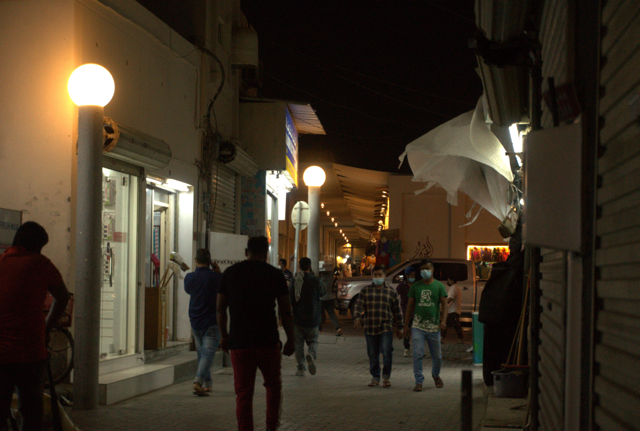In the midst of the ongoing crisis, Qatar is keen on showing the world that it is not really affected by the regional blockade. As the blockade approaches the two-month mark, the Saudi-led quartet is refusing to scale down its demands. This means the blockade might go on for several more months, and the ones first and most critically affected are the already marginalised migrant workers.
However, instead of addressing this potential catastrophe, Qatar’s Ministry of Administrative Development, Labour and Social Affairs released a video that paints a pretty but unrealistic picture of workers’ rights in the country.
During a recent visit to Qatar, Migrant-Rights.org assessed how the blockade’s ground realities affect lower-income migrant workers.
The top three concerns that emerge are:
Forced Leave
[tweetable]Several migrant workers, across sectors and economic strata, have been asked to go on extended unpaid leave.[/tweetable] Migrant-Rights.org will publish an in-depth report on this practice in the coming days. Given the climate of uncertainty, even embassies of workers’ origin countries are refusing to go on record with comments on this issue. Two Asian embassies confirmed that they have received complaints on forced leave. “Some are given a part of end of service benefits, others not even that. What’s the assurance that they will be brought back after four or six months? Or they will be paid from here if visa is cancelled,” one labour official said.
An official at the Sri Lankan embassy says complaints on forced leave are still far fewer than complaints on payment of wages.
Job Loss
Workers in the construction sector, mainly those employed by supply companies, have been given two to four weeks to find alternative jobs or leave the country.
Our interviews and research reveal that the problem will become more severe when the current supply of construction material runs out. Companies are preparing by putting relationships with manpower supply companies on hold. The workers most affected now are subcontracted workers, laying bare the tiers of exploitative practices in the labour supply chain.
Large construction projects depend heavily on subcontractors, as company responses to Business and Human Rights Resource Centre surveys reveal. Companies in charge of some of the largest construction projects in the country include: The Qatari Diar-Saudi Bin Laden Group, which directly employs 9000 workers, and another 4800 through subcontractors. SNC-Lavalin which employs only 1706 directly, while 2314 are employed through manpower supply companies and another 834 through sub-contractors.
Interserve has three associate companies in Qatar and has 10,417 direct employees and 2,600 sub-contracted.
While these large companies may comply with prevailing standards, subcontractors, especially those several rungs down the supply chain, often work in a grey area.
Reports by Migrant-Rights.org and Amnesty International’s 2016 report detail this supply chain problem.
One South Asian worker we spoke to has been given until Aug 15 to find another job. Due to the summer midday work ban, he works split shifts, the second shift ending only close to 11 pm. “Where is the time for us to go look for a job? How is this enough time.”
Food
On average, there has been a 10 to 15% increase in food prices. While this is a pinch hardly felt by the wealthy Qatari citizens and well-placed expatriates, it is taking a toll on lower-income expatriates. Cafeterias near labour accommodation have only increased their prices by a riyal or two per meal. One worker we spoke to explains why eating out is not economically feasible. “Most of us can’t afford to eat every meal outside. You pay 5-6 for breakfast, another 10 for lunch and maybe 7 for dinner. That adds up to 22 or 24 riyals a day, about 600 riyals a month. That’s almost all our salary. So we prefer buying provisions and cooking. We can control the expenditure better. But it’s getting really tough. Everything is about 10-15% higher. That means from 200 or so riyals we set aside for food, now we have to set aside 250.”
A different kind of impact is felt in accommodations where food is provided. In Qatar’s Labour City, there are industrial kitchens and workers are provided food.
But there has been a change in the kind of food served; Bimal* a resident says, “We used to be given vegetables and fruits daily. Now it’s only meat every day, very little vegetable and no fruits. In this heat, working outside, this causes stomach cramps for us.” A large percentage of workers housed here are from Nepal, and they are unused to eating meat on a daily basis.
James Lynch, Amnesty International’s deputy head of global issues, called upon Qatar to use this crisis to bring about a meaningful change for migrant workers.
If the government takes the path “of continuing to promote hollow reforms, then migrant labour abuse will be the gift that keeps on giving for Qatar’s political opponents,” he writes.
“But the trouble for Qatar is that while criticisms aimed at it by its neighbours may be dripping with double standards, they are not fundamentally “fake news.”
“Forced labour is rife among migrant workers in Qatar. The government has made no serious moves to investigate and address the large number of unexplained deaths among the young, mostly South Asian, men who are building the country’s infrastructure.”




